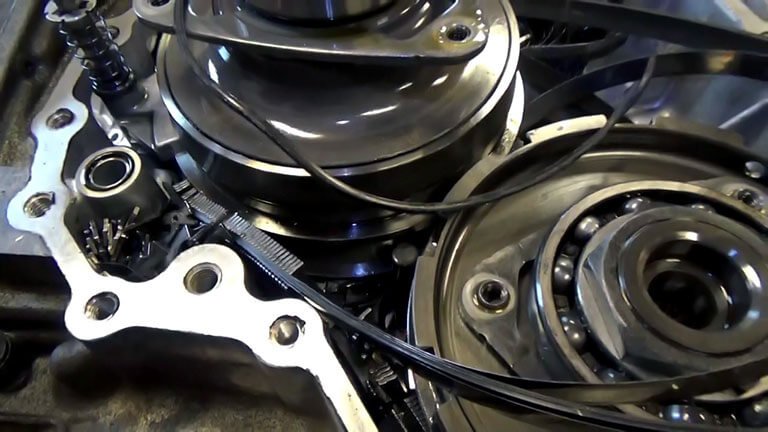Nissan CVT Transmission Problems: Key Fixes & Insights
Nissan CVT transmission problems often include slipping, shuddering, and unexpected acceleration. These issues can lead to costly repairs and decreased vehicle performance.
Nissan’s Continuously Variable Transmission (CVT) has garnered attention for its unique design and efficiency. However, many drivers have reported various problems that can hinder performance and safety. Common issues include excessive noise, erratic shifting, and overheating, which can result in a frustrating driving experience.
These transmission problems often stem from design flaws or insufficient maintenance. Awareness of these potential issues can help Nissan owners take proactive measures to ensure their vehicle remains reliable. Understanding the signs of CVT failure can save money and prevent further damage. Regular checks and timely repairs are essential for maintaining optimal performance.
Introduction To Nissan Cvt Transmissions

Nissan has made significant strides in automotive technology. One of its standout features is the continuously variable transmission (CVT). This system offers smooth driving experiences and improved fuel efficiency. However, it has faced some challenges over the years.
The Shift To Continuous Variable Transmission
Nissan introduced CVT technology to enhance vehicle performance. Traditional transmissions have fixed gear ratios. In contrast, CVTs provide an infinite range of gear ratios. This innovation allows for:
- Smoother acceleration
- Better fuel economy
- Improved engine efficiency
Many Nissan models now utilize CVTs. This includes popular vehicles like the Altima, Rogue, and Sentra. The shift to CVT has changed how drivers experience their cars.
Benefits Of Cvt In Modern Vehicles
CVTs offer several advantages over traditional transmissions. These benefits include:
- Fuel Efficiency: CVTs optimize engine performance, saving fuel.
- Smooth Operation: Continuous gear shifting provides a seamless driving experience.
- Less Maintenance: Fewer moving parts can lead to lower maintenance costs.
Drivers appreciate the blend of comfort and efficiency. However, some Nissan CVT owners report issues. Understanding these benefits and challenges is crucial for potential buyers.
| Benefit | Description |
|---|---|
| Fuel Efficiency | Better mileage compared to traditional transmissions. |
| Smooth Operation | No noticeable gear shifts enhance comfort. |
| Less Maintenance | Fewer parts lead to reduced service needs. |
Common Nissan Cvt Transmission Issues
Nissan vehicles often use CVT (Continuously Variable Transmission) systems. While these transmissions offer smooth driving, they can develop problems. Understanding these issues can help you maintain your vehicle better.
Transmission Slipping
Transmission slipping is a common issue in Nissan CVTs. This happens when the engine revs up, but the car does not accelerate as expected. It can feel like the car is losing power.
- Check for warning lights on the dashboard.
- Notice any unusual changes in engine speed.
- Pay attention if the vehicle hesitates during acceleration.
Transmission slipping can lead to serious damage. Regular maintenance is crucial to prevent this issue.
Delayed Acceleration Response
Delayed acceleration response can frustrate drivers. This issue occurs when there is a lag between pressing the gas pedal and the car moving forward.
- Notice if the car hesitates before speeding up.
- Check for any unusual engine sounds during acceleration.
- Be aware of any sudden jerks while driving.
This problem can make driving less enjoyable. Timely inspections can help identify the root cause.
Unusual Noises And Vibrations
Hearing unusual noises or feeling vibrations while driving can signal transmission issues. These sounds can vary from whining to grinding.
| Noise Type | Possible Cause |
|---|---|
| Whining | Low transmission fluid levels |
| Grinding | Worn out components |
| Clunking | Faulty mounts or gears |
Ignoring these symptoms can lead to costly repairs. Always consult a professional if you notice any changes.
Recognizing The Symptoms Of Cvt Failure
Understanding the signs of CVT failure is crucial. Early detection can save you money and prevent further damage.
Dashboard Warning Lights
Pay attention to your dashboard. Warning lights can indicate CVT issues. Common lights to watch for include:
- Check Engine Light: Signals various engine problems.
- Transmission Fluid Temperature Light: Indicates overheating.
- Slip Indicator Light: Suggests slipping in the transmission.
Ignoring these lights can lead to severe damage. Always take them seriously.
Performance Irregularities
Notice any changes in how your car drives. Common performance issues include:
- Delayed Acceleration: Sluggish response when pressing the gas.
- Unusual Noises: Grinding or whining sounds from the engine.
- Shuddering: Vibration felt during acceleration.
- Loss of Power: Difficulty climbing hills or merging.
These symptoms can indicate a failing CVT. Address them promptly to avoid complications.
Fluid Leaks And Overheating
Check for fluid leaks under your vehicle. CVT fluid is typically reddish. Look for:
- Red fluid spots: Indicate a leak.
- Low fluid levels: Can cause overheating.
Overheating can lead to severe damage. Monitor the temperature gauge closely.
Regular maintenance helps prevent these issues. Always check fluid levels and quality.
Case Studies: Nissan Models And Their Cvt Lifespan
Nissan’s CVT (Continuously Variable Transmission) has gained attention for its unique design. Some models experience issues affecting their lifespan. This section highlights specific Nissan models and their reliability with CVTs.
Reliability Reports
Many Nissan owners report varying experiences with CVT reliability. Below is a table summarizing common issues:
| Nissan Model | Common Issues | Reported Lifespan |
|---|---|---|
| Nissan Altima | Shuddering, overheating, and transmission failure | 80,000 – 120,000 miles |
| Nissan Sentra | Slipping, noise, and delayed acceleration | 70,000 – 100,000 miles |
| Nissan Rogue | Loss of power, erratic shifts | 60,000 – 110,000 miles |
These reports highlight significant concerns. Factors like driving habits and maintenance impact CVT lifespan.
Model-specific Concerns
Each Nissan model has unique characteristics affecting CVT performance. Here are key points for popular models:
- Nissan Altima:
- Commonly experiences shuddering during acceleration.
- Overheating issues reported in hot climates.
- Nissan Sentra:
- Slipping transmission often noted by drivers.
- Noise during operation raises concerns.
- Nissan Rogue:
- Power loss during acceleration can be alarming.
- Erratic shifting affects driving comfort.
Understanding these model-specific concerns helps potential buyers. Awareness can lead to informed decisions regarding maintenance and repairs.
Diagnosing Nissan Cvt Problems
Understanding how to diagnose Nissan CVT problems is crucial for every owner. CVT issues can lead to poor performance and increased costs. Early detection can save time and money. Here’s how to identify these problems effectively.
Professional Diagnostic Tools
Using professional diagnostic tools is the best way to find CVT issues. These tools can provide detailed information about your vehicle’s system. Here are some popular tools:
| Tool Name | Function |
|---|---|
| OBD-II Scanner | Reads trouble codes from the CVT system. |
| Transmission Fluid Tester | Checks fluid quality and levels. |
| Pressure Gauge | Measures hydraulic pressure in the CVT. |
These tools help mechanics detect problems quickly. They provide accurate readings, making repairs easier. Regular diagnostics can prevent severe damage.
Self-diagnostic Methods
Some self-diagnostic methods can help you identify CVT problems. These methods are simple and can be done at home. Here are some steps to follow:
- Check for Warning Lights: Look for dashboard warning lights.
- Listen for Unusual Noises: Pay attention to grinding or whining sounds.
- Monitor Performance: Notice any slipping or delayed acceleration.
- Inspect Transmission Fluid: Check for dark or burnt fluid.
- Test Shifting: Ensure smooth shifts between gears.
Use these methods to catch issues early. Regular checks can help maintain your CVT’s health. If problems persist, consult a professional.
Solutions For Prolonging Cvt Life
Maintaining your Nissan’s CVT can extend its lifespan. Simple steps can help you avoid common issues. Regular care ensures better performance and fewer problems.
Routine Maintenance Tips
- Check Fluid Levels: Regularly inspect CVT fluid levels.
- Fluid Changes: Change CVT fluid every 30,000 miles.
- Inspect Filters: Clean or replace filters as needed.
- Monitor Temperature: Keep an eye on transmission temperature.
Best Practices For Cvt Care
Follow these best practices for optimal CVT health:
- Avoid Overloading: Do not exceed the vehicle’s weight limit.
- Gentle Acceleration: Accelerate smoothly to reduce stress.
- Use Recommended Fluids: Always use Nissan-approved CVT fluids.
- Regular Inspections: Schedule inspections to catch issues early.
| Maintenance Task | Frequency |
|---|---|
| Check Fluid Levels | Monthly |
| Change CVT Fluid | Every 30,000 miles |
| Inspect Filters | Every 15,000 miles |
| Transmission Inspection | Every year |
Fixing Common Cvt Issues
Nissan CVT transmissions can face several problems. Identifying these issues early helps avoid costly repairs. Knowing how to fix them is vital for every Nissan owner.
Replacement Vs. Repair
Deciding between replacement and repair is crucial. Here are some key points to consider:
- Replacement might be needed for severe damage.
- Repair is often cheaper for minor issues.
- New CVTs come with warranties, providing peace of mind.
- Rebuilt CVTs can save money but may lack reliability.
Consider the following table for quick comparisons:
| Aspect | Replacement | Repair |
|---|---|---|
| Cost | Higher | Lower |
| Time | Longer | Shorter |
| Warranty | Usually included | Varies |
Cost-effective Solutions
Many owners seek ways to save money. Here are some cost-effective solutions:
- Regular maintenance helps prevent major issues.
- Use OEM parts for better compatibility.
- Check fluid levels regularly to avoid overheating.
- Address small issues before they escalate.
Consider DIY fixes for minor problems:
- Change the transmission fluid.
- Inspect belts and pulleys.
- Reset the transmission control module.
Always consult a professional for complex issues.
Preventative Measures And Owner Vigilance
Preventing Nissan CVT transmission problems requires proactive measures. Owners must stay alert and informed. Regular maintenance and timely interventions can save time and money.
Upgrading Cvt Software
Upgrading your CVT software is essential. Nissan often releases updates to enhance performance. These updates fix bugs and improve reliability. Follow these steps to upgrade:
- Visit a certified Nissan dealer.
- Ask about the latest software updates.
- Schedule an appointment for installation.
Regular updates keep your transmission running smoothly. They can prevent issues before they arise.
Choosing The Right Transmission Fluid
Using the correct transmission fluid is crucial. Always check your owner’s manual for specifications. Using the wrong fluid can lead to severe damage.
| Fluid Type | Recommended For |
|---|---|
| Nissan CVT Fluid NS-2 | Most Nissan CVTs |
| Nissan CVT Fluid NS-3 | Latest Nissan models |
Regularly check fluid levels. Replace it as needed. Clean fluid ensures a longer lifespan for your CVT.
- Monitor fluid color and smell.
- Check for leaks under your vehicle.
- Change fluid according to the schedule.
Navigating Warranty And Recall Options
Nissan CVT transmission issues can cause concern for many owners. Understanding your warranty and recall options is crucial for addressing these problems. Knowing your rights can save time and money.
Understanding Your Coverage
Nissan offers various warranties for their vehicles. Here’s what to know:
| Warranty Type | Coverage Duration | Key Points |
|---|---|---|
| Basic Limited Warranty | 3 years / 36,000 miles | Covers most repairs and defects. |
| Powertrain Warranty | 5 years / 60,000 miles | Covers engine and transmission issues. |
| Extended Warranty | Varies | Can cover additional repairs and services. |
Always check your vehicle’s warranty booklet. Look for specific details about CVT coverage. Many owners are unaware of their rights. Keep records of all service appointments and repairs.
Recent Recalls Affecting Nissan Cvts
Several Nissan models have faced recalls due to CVT issues. Staying informed helps you take action.
- Model Year 2013-2016 Altima: Recall for potential CVT failures.
- Model Year 2015-2017 Rogue: Issues with transmission overheating.
- Model Year 2014-2017 Sentra: Problems with transmission performance.
Check the National Highway Traffic Safety Administration (NHTSA) website. Enter your VIN to see if your vehicle is affected. This can help you stay ahead of potential issues.
Contact your local Nissan dealership for more information. They can assist with recall repairs and warranty claims. Be proactive. Ensure your vehicle operates smoothly and safely.
The Future Of Nissan Cvt Technology
Nissan’s Continuously Variable Transmission (CVT) technology has evolved. It faces challenges but shows promise for the future. Drivers seek reliability and performance. Nissan aims to meet these demands with new innovations.
Innovations In Cvt Design
Nissan invests in advanced CVT designs. Key innovations include:
- Improved Materials: Using stronger, lighter materials enhances durability.
- Enhanced Cooling Systems: Better cooling prevents overheating during long drives.
- Smart Software: Updated software optimizes shifting for smoother rides.
These advancements aim to reduce common issues. The goal is a more reliable driving experience.
Nissan’s Response To Consumer Feedback
Nissan listens to its customers. Feedback helps shape future CVT technology. Key responses include:
- Increased warranty coverage for CVT components.
- Regular software updates to improve performance.
- Enhanced customer service for CVT-related issues.
Nissan is committed to quality. They strive to regain consumer trust. The focus is on delivering a better driving experience.
Frequently Asked Questions
What Are Common Nissan Cvt Transmission Problems?
Common issues include slipping, shuddering, overheating, and unexpected acceleration. Regular maintenance can help prevent these problems.
How To Identify Cvt Transmission Issues?
Signs include unusual noises, poor acceleration, and warning lights. Pay attention to changes in vehicle performance.
What Causes Nissan Cvt Transmission Failure?
Causes often include overheating, low fluid levels, or manufacturing defects. Regular checks can help catch these issues early.
Can Cvt Problems Be Repaired Easily?
Repair options vary; some issues may need complete replacement. Consult a qualified technician for an accurate diagnosis.
How To Maintain Nissan Cvt Transmission?
Regular fluid changes and routine inspections are key. Keeping an eye on fluid levels can prevent major issues.
Conclusion
Nissan CVT transmission issues can be frustrating for drivers. Recognizing the symptoms early can save you time and money. Regular maintenance plays a crucial role in preventing problems. Stay informed about recalls and updates from Nissan. Addressing concerns promptly ensures your vehicle runs smoothly for years to come.
Stay proactive!






